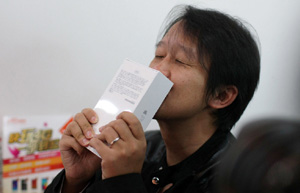 |
|
Tony Zhan, 32, holds up his new iPhone 6 Plus after it went on sale at the Apple store in Pasadena, California September 19, 2014. [Photo/Agencies] |
Chinese telecom operators are reportedly cutting subsidies to
The major carriers in China, China Unicom, China Mobile and China Telecom will reduce subsidies on the iPhone in part to improve financial performance as the subsidies is not tax exempt, said James Yan, a senior analyst at IDC. As Apple launched iPhone 6 on Chinese mainland on Oct 17, China Mobile, China Unicom and China Telecom released their the pricing for the iPhone 6 and 6 Plus. The telecom offered the phones on contract at about the same or even more than Apple own retail stores. The iPhone 6 and 6 Plus retail starting at 5,288 yuan ($860) and 6088 yuan ($994). Telecom companies typically offer subsidized pricing for mobile phones to entice customers to sign contracts. The company's recuperate the initial loss on the sales price of the phone through the contract period, typically one to two years. This time around, Chinese companies are opting to charge full price for the phone and offer service bonuses to entice consumers. China Mobile is offering customers the base iPhone 6 model for 5,288 yuan. Customers will receive a balance bonus of as much as 3,264 yuan on a two-year contract. That balance can be used towards cellular data plans, voice plans, and other charges the user may incur. In comparison, China Unicom offers a different plan with a package starting at 5,499 yuan. This plan allows the option of a one to three year contract and includes a maximum balance bonus of 5,472 yuan. China Telecom offers a two or three year contract with a useable balance that totals the cost of the phone. "China Mobile stopped offering a contracted iPhone for free in order to attract customers," said Yan. He added that China Unicom and China Telecom also have reduced the subsidies on the iPhone 6 compared with earlier models. The strategy evolves as Apple taps into a more high-end customer base in China. "Its (Apple's) cooperation with major Chinese carriers will continue but the tech giant will depend less on them," said Yan. Apple was the sixth-largest smartphone vendor in China by volume during the second quarter with a market share of nearly 7 percent, according to consultancy Analysys International. According to Yan, e-commerce has also played a big role in Apple's sales in China. Yan estimates that 20 percent of the iPhone 6's sales came from online shopping sites such as JD.com. JD.com delivered the first batch of iPhone 6 within three hours of the official launch in the Chinese mainland on Oct 17, New Express Daily reported. "I'm thinking of buying a contracted iPhone 6 by the end of the year in the US, because it will be much cheaper there," said Laura Fernandez, a student in Uinersity of International Business and Economics in Beijing.
|
 |
 |
| Apple unveils iPad Air 2 with Touch ID to secure Apple pay | iPhone 6 and 6 Plus launched in China |
